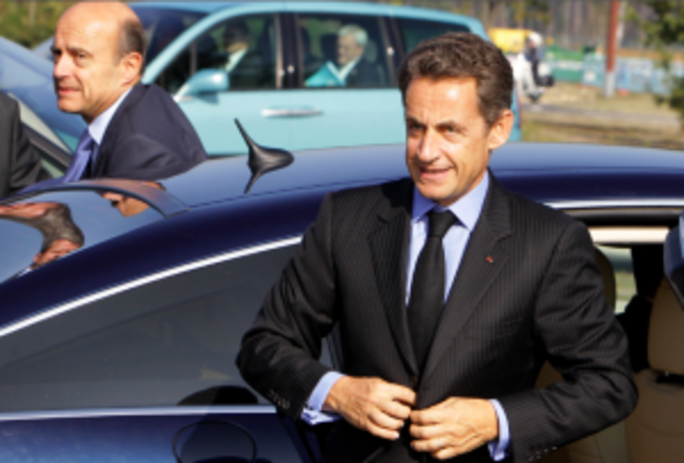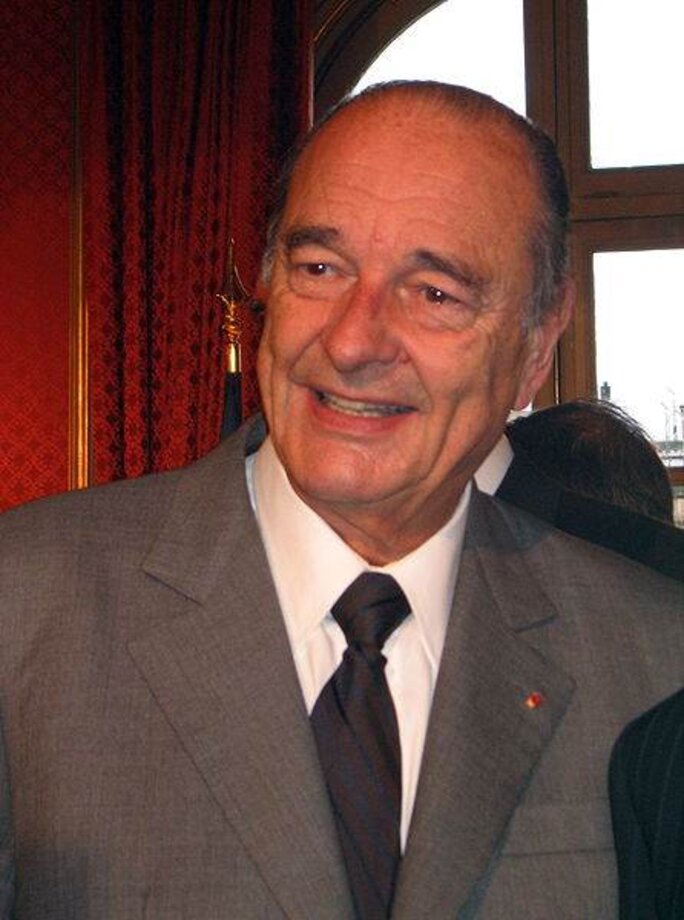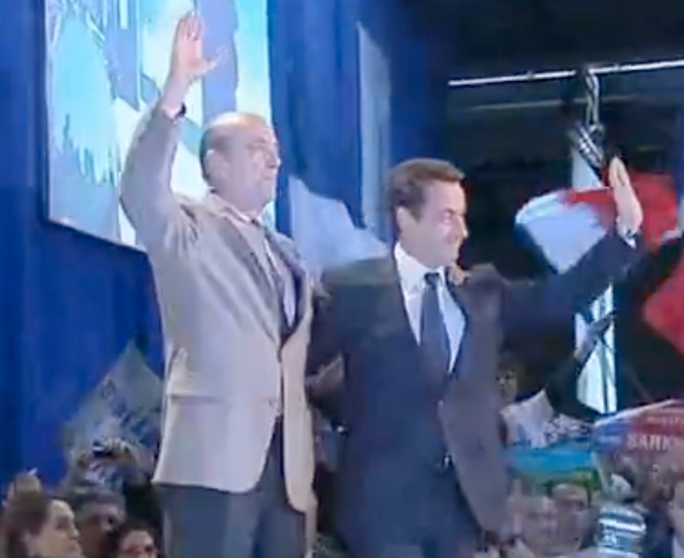President Nicolas Sarkozy's appointment of veteran Gaullist politician Alain Juppé to the post of foreign affairs minister marked the consummation of a forced political marriage between two longstanding rivals,celebrated in November with Juppé's arrival as defence minister. Marine Turchi charts their turbulent 16 years of sniping and strife, all of which promise further fireworks ahead of next year's presidential elections.
--------------------------
Speaking to journalists in Bordeaux on Monday (see video below), after his appointment as France's new Minister of Foreign Affairs, Alain Juppé said of his brief experience as defence minister under President Nicolas Sarkozy: "I told myself that I'd have trouble working with him, but after three months I've realized that it is possible."
Juppé's arrival at the foreign ministry, gives President Nicolas Sarkozy a heavy counter-weight to his prime minister François Fillon, and is something of sweet revenge for Juppé, who has seen his political career dive to almost fatal depths since his heady days as prime minister between 1995 and 1997. He is now back as an essential figure in the re-launch of Sarkozy's government, destabilized by ministerial excesses just three months after the last reshuffle; apart from Alliot-Marie's Tunisia debacle, interior minister Brice Hortefeux, ousted at the same time as the foreign minister, was trailing a sentence for making racist comments and another for violating ‘presumption of innocence' (contempt of court) laws.
Juppé, who already served as foreign minister between 1993 and 1995, has imposed his own conditions. Claude Guéant, chief-of-staff at the Elysée Palace, the French presidential office, had until now been the backroom manager of French foreign policy, especially in Africa and the Arab nations. He has now replaced Hortefeux at the Minister of the Interior, out of Juppé's way, while Jean-David Levitte, Sarkozy's key foreign policy advisor and until now another key meddler in foreign ministry decision-making, has officially asked for, and been given, release for retirement as of April 1st.
But Juppé still has a few potential obstacles in his path. Not least among these is Nicolas Sarkozy himself. There is a long tradition among French presidents all the way through the Fifth Republic of allocating themselves the design and public presentation of foreign policy while leaving their governments the front line role in domestic matters. Although Nicolas Sarkozy has until now adopted a hands-on approach to both, his new role as chairman of the G8 and the G20 offers him an opportunity of attaining a gravitas hitherto absent in home affairs ahead of presidential elections in 2012.
Quite how successfully the two will perform together remains to be seen. If Juppé brings a perceived solid hand to a ministry that has lost its way, the conflict between the two men in both political vision and personal ambition promises fireworks ahead. The history of their relationship is one of swings-and-roundabouts fortune in the shadow of a man once the political father of both, former Gaullist leader and president Jacques Chirac.
May 1995: After a bitter and divided campaign on the right, Jacques Chirac was finally elected president on his third attempt, at the age of 62, beating Socialist Party candidate Lionel Jospin. Chirac had spent two years preparing for the event, sure of running as the unique mainstream right candidate, under the banner of his Gaullist RPR party. But just six months before the elections, then-Prime Minister Edouard Balladur, a long-standing Gaullist ally, betrayed Chirac by announcing he would also run as a mainstream conservative right candidate. Nicolas Sarkozy joined several other rebel Gaullist figures in rallying to Balladur. The schism left deep wounds on the right, which have never healed to this day. Balladur, despite being consistently presented by opinion polls as the favourite candidate, lost the elections and never recovered politically.

After Chirac's RPR and conservative right allies won the legislative elections that immediately followed the presidential poll, he appointed Alain Juppé, his longtime loyal servant and then-dauphin, as prime minister. In his acclaimed and revealing biography of Chirac, ‘La Tragédie du président'(‘The tragedy of the president'), veteran French journalist Franz-Olivier Giesbert recounted how Chirac instructed Juppé "not to name any former Balladur minister into his team".
Sarkozy had been budget minister under Balladur, who had served as prime minister from 1993 to 1995 in an uneasy political ‘co-habitation' between his right-wing government and socialist president François Mitterrand, and was Balladur's presidential election campaign spokesman.
"A proper fatwa," continued Giesbert. "The new prime minister [editors note: Alain Juppé] would not have the right to re-cycle Nicolas Sarkozy for whom he had always had a certain soft spot, even though he was wary of him." In the end, a few Balladur supporters, notably François Fillon, the current prime minister, were admitted into government - but not Sarkozy.
Juppé in 1995 was a powerful figure; prime minister, mayor of Bordeaux (he served an initial term between 1995 and 2004), and president of the ruling RPR Gaullist party (until 1997). Sarkozy, meanwhile, Member of Parliament for, and mayor of, the plush district of Neuilly-sur-Seine, west of Paris, defiantly faced Juppé in the role of leader of the Balladurian camp. In a largely successful attempt to remain a high-profile force to be reckoned with, he sniped at government in parliament, rallying support for amendments to bills, establishing himself as a political force to be reckoned with by becoming a thorn in Juppé's side.
April 1997: France entered into a social crisis unprecedented since the 1968 revolts, sparked by Juppé's attempts to reduce public spending, and in particular his attempted reform of France's comparatively generous public welfare system.As part of the political manoeuvring to shore up the right, Juppé hatched a plan to appoint two former Balladur ministers, François Léotard and Nicolas Sarkozy, to his own government. He intended appointing Sarkozy to the post of finance minister. In his biography of Chirac, Giesbert observed of Juppé: "He considered [Sarkozy] to be the best of the new generation. A professional who left nothing to chance. Along with that, a touch populist and very pedagogic. In short, an anti-Juppé."
Juppé says Sarkozy has different 'ways of seeing life'
Chirac's response to the crisis was to prefer the dissolution of parliament, a move advised by his then chief-of-staff Dominique de Villepin, hoping that his Gaullist right would be given a clear mandate after fresh legislative elections. But the plan turned into a disaster, with the Socialist Party-led opposition sweeping Juppé out of office in June. The outgoing prime minister also lost the presidency of Chirac's RPR party, replaced by Philippe Séguin, who placed Sarkozy as the party's general secretary.
This was the founding moment of the love-hate relationship that the two men have been in ever since, each playing a role as Chirac's political son, one the favourite, the other the rebel. Juppé himself compared their relationship as akin to that between Chirac and his early rival, former president Valéry Giscard d'Estaing, but "without the hatred". He made the comment in an interview with French public radio station France-Info in 2009, timed for the publication of his autobiographical acount ‘Je ne mangerai plus de cerises en hiver' (‘I will never more eat cherries in winter'). He continued: "I have amicable relations with Nicolas Sarkozy, we haven't got the same temperament, we sometimes have differences and I express them, but overall I hope he succeeds."

Enlargement : Illustration 3

Sarkozy's family background is that of urban professionals, his father a Hungarian émigré who launched an advertising company, his mother a Parisian lawyer, a profession that Sarkozy entered after a comparatively modest higher education performance; he also entered Sciences Po, but failed to graduate. He talks with none of Juppé's erudite manner, to the point of occasional grammatical incoherence, curtailed the influence of ENA graduates and is twice divorced. His brashness and attraction to celebrities and flashy watches earned him a ‘bling-bling' image in stark contrast to his presidential predecessors.
Juppé is the old right, Sarkozy the modern one. In a book published last month composed of conversations with former socialist prime minister Michel Rocard, chaired by the political journalist Bernard Guetta, Juppé readily admits he and Sarkozy have differences "of temperament", "behavior" and "ways of seeing life".
"I've never been a Sarko-idioliser," he says in the book, a series of political reflections entitled ‘La Politique telle qu'elle meurt de ne pas être' (‘The politics dying from not being so'). "I have known him for a long time. I know his qualities and his weaknesses like he knows mine [...] The American model of material success fascinates me less than it appears to attract him. And then, there is his way of governing, of giving all the major decisions to himself, of constantly being at the forefront, what has become called the ‘hyper-presidency."
The two men fought each other over the ashes of the former Gaullist RPR party. During the campaign for the presidential elections in 2002, when Jacques Chirac won a second term of office after a shock, second-round play-off with far right National Front leader Jean-Marie Le Pen, Juppé chose to rally the centre ground, while Sarkozy wooed the right, subsequently becoming Chirac's security-driven interior minister.
Backed by Jacques Chirac, Juppé became president of the new UMP party, created in 2002 as the umbrella party of the right and centre-right into which the dominant RPR was merged. Sarkozy, with his sights on the presidential elections in 2007, was in no mood to let it escape from his control. There were bitter exchanges between the two men during the congress that officially wound down the RPR in September of that year, with Sarkozy pronouncing: "The UMP will be a team business, or it will not be." Juppé later removed Sarkozy's longstanding right-hand man Brice Hortefeux, from the UMP managerial committee. Over the following two years, the two men were frequently and publicly at loggerheads.

January 2004: Alain Juppé was given a suspended prison sentence of 18 months and disqualified from holding public office for ten years at the end of a trial into a vast fraud scam involving the Paris city council and the RPR. The scandal dated back to Chirac's period as mayor of Paris (1977-1995), when RPR party members were fraudulently placed on the payroll of Paris City Hall. Juppé was found guilty for his responsibility in the scam as both secretary general of the RPR and also Paris deputy mayor in charge of the city's finance department between 1983 and 1995. Stripped of all his political functions, Juppé left France for a teaching job in Canada, at the Montreal-based National School of Public Administration. Sarkozy replaced him as head of the UMP.
After Juppé lodged an appeal, the sentence was reduced to one year's disqualification from public office, and his suspended prison sentence was reduced to 14 months, allowing his political comeback before the 2007 presidential elections.
August 2006: Sarkozy and Juppé - who had returned France from Montreal - agree to a pact of non-aggression. In exchange for the support of his candidature in the presidential elections due the following year, Sarkozy offered Juppé the presidency of the French parliament. In October that year Juppé was re-elected mayor of Bordeaux. Following Sarkozy's presidential election victory in May, Juppé was given the send-most powerful government post as Minister of the Environment, Ecology and Sustainable Development. But the return to state affairs lasted just one month; in the ensuing legislative elections in June he was forced to step down after losing his Bordeaux parliamentary constituency.
Je t'aime moi non plus
Over the past three years, Juppé has alternated his public declarations of support for reform with snippets of biting criticism. He said he never believed in Sarkozy’s promise of a rupture with the past, demanded tighter fiscal policies and an increase in VAT. In an interview with French radio station RTL in November 2009 and quoted in the daily Le Monde, Juppé attacked the speed with which the government was engaging in reforms. “I told the president at one point that the accumulation of reforms is a bit dizzying,” he said. “I don’t know if he heard me.”
In November 2009, the French government launched a national “debate” on national identity, via a website and public meetings, led by the question: “What does ‘being French’ mean for you?”. The move was denounced by critics, not least by Juppé, as an attack on ethnic communities and customs in France. “Everything that pits communities against each other is detestable,” he commented in an interview with French daily Le Parisien in December 2009. “The question ‘what does it mean to be French’ doesn’t really need to be asked,” he said. “We know the answer.”
He attacked the government ‘fiscal shield’ policy1 of a cap on tax for the richest income earners, saying “we see today that a small minority of very rich never cease to get richer.” He has called for additional help for the jobless who have reached the end of their period of eligibility for unemployment benefits, and called for publicly-funded accommodation for workers on or under the poverty line. Finally, in April 2010 he crossed a significant line by telling Le Monde that he was ready to “offer” an alternative in the 2012 presidential elections.
So much for the hate. Although certainly more a question of pragmatism than love, the two men have also sparred niceties, one with compliments, the other with offers of promotion. In May 2010, three years into Sarkozy's presidency, Juppé found praise for the president in "the manner in which he has managed the crisis" (see video above, in French only). He added that some reforms "had helped advance things". Sarkozy made him a special envoy to the 2008 UN summit on inter-religious and inter civilization dialogue. IN 2009, he appointed Juppé as co-president (with Michel Rocard) of the commission for choosing which new technology sectors should benefit the grand emprunt, a 35 billion-euro national investment fund largely financed by loans raised on the financial markets. In January 2010, following the death of Philippe Seguin, Juppé was offered, but turned down, the prestigious job of president of the Court of Accounts, the public spending audit office. Finally, in the government reshuffle last November, Juppé was first offered, but again refused, the post of foreign minister - he chose defence. (Interestingly, his critical comments on France's reintegration of NATO military command, cited above, were subsequently removed from his blog - pragmatism oblige).
March 1st 2011: Juppé finally returned to the Quai d'Orsay, as the riverside foreign ministry building is commonly called, 18 years after his first passage there and just eight months after signing, along with former socialist foreign minister Hubert Vedrine, a public call to save the ministry from an"unprecedented weakening" of French diplomacy. In the opinion article published by Le Monde on July 6th last year, the pair deplored government-led spending cuts that would provide "marginal" savings while exacting "devastating" effects. "The instrument is at breaking point," the pair wrote, "that is observed the world over. All our partners are aware of it." Unlike his blog post on NATO, the article can still be found here.
This week he announced his priorities as foreign minister; a strengthening of relations with emerging countries, development of a joint European defence policy, Africa and the re-launching of the Union for the Mediterranean. How much room for manouevre Sarkozy has left him will be first tested at the European Council extraordinary meeting on the Libyan crisis called for March 11th, and then at the March 14th-15th meeting of G20 foreign ministers in Paris.
Meanwhile, following his appointment, Juppé briefly returned to the question of next year's presidential elections and whether he would stand against Sarkozy. "If he is a candidate, I will not be," announced France's new top diplomat.
------------------------
1: Known as le bouclier fiscal, this broadly limits annual taxation on assets at 50% of yearly income.The government announced in March it is to be scrapped.


